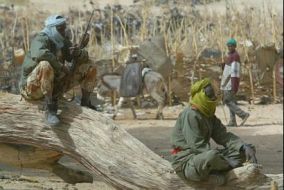Chad denies supporting rebellion in Sudan’s Darfur
By TAREK EL-TABLAWY, Associated Press Writer
UNITED NATIONS, Sep 30, 2004 (AP) — Chad denied that it was supporting a rebellion in western Sudan , saying it had “spared no effort” to aid the government of Sudanese President Omar el-Bashir.
 Rather, Chad has played a major role in brokering several peace agreements in Sudan, Nagoum Yamassoum, Chad’s minister of state for foreign affairs and African integration, told world leaders Wednesday at the U.N. General Assembly’s ministerial meeting.
Rather, Chad has played a major role in brokering several peace agreements in Sudan, Nagoum Yamassoum, Chad’s minister of state for foreign affairs and African integration, told world leaders Wednesday at the U.N. General Assembly’s ministerial meeting.
He said Chad took on that role “because it is our duty, more than any other country’s, to help our Sudanese brothers to reconcile.”
“We have spared no effort to help President Omar el-Bashir and his government, with respect for the sovereignty of their country, to resolve the Darfur conflict,” said Yamassoum, adding that this help has exposed Chad to accusations of favoritism.
His comments came a day before Sudan’s foreign minister and the U.N.’s top human rights official are scheduled to go before closed sessions of the U.N. Security Council.
The meeting with Sudan’s Foreign Minister Mustafa Osman Ismail is aimed at having “a frank discussion” on Darfur, Spain’s U.N. ambassador, Juan Antonio Yanev-Barnuevo, the current council president, told reporters Wednesday.
He said Ismail had asked for the meeting but the council would also use the opportunity to “directly” convey to him its views on the resolution on Darfur adopted by the council on Sept. 18 and “what needs still to be done to address seriously the situation.”
The resolution called for the creation of an international commission to investigate claims of genocide in Darfur. It also gave the thumbs-up for a significantly expanded African Union force in Darfur and threatened sanctions against the Khartoum government if it failed to act to rein in Arab militias blamed for attacks on black African villages that have killed more than 50,000 people and forced 1.2 million to flee their homes in the arid western region.
U.S. Secretary of State Colin Powell on Tuesday, in unusually candid remarks, said Wednesday that the four countries which abstained on the resolution _ Russia, China, Algeria and Pakistan _ did so out of commercial interests.
Ismail on Tuesday described the resolution as imbalanced and lashed out at the United States, saying its claims that the conflict in Darfur was genocide were little more than a political gambit aimed at distracting the attention of U.S. voters from the situation in Iraq ahead of the U.S. presidential elections in November.
The meeting with Ismail is scheduled for the afternoon, after the Council meets the U.N. High Commissioner for Human Rights Louise Arbour who recently returned from a weeklong trip to Sudan, including a visit to Darfur. She is expected to argue strongly for a massive increase in the number of U.N. workers in the region.
The bloodletting in Darfur began in February 2003, when two non-Arab African rebel groups launched attacks primarily on government and military targets to press their demand for a greater share of power and resources for the region.
The government is accused of trying to put down the rebellion by backing armed Arab herdsmen known as Janjaweed who long have competed with black African villagers over Darfur’s scarce resources. The United Nations has said Darfur is the world’s worst humanitarian crisis.
World leaders speaking during the two-week General Assembly ministerial session, which ends Thursday, have called for concerted action on Sudan.
Spain’s Yanev-Barnuevo said U.N. Secretary-General Kofi Annan is expected to set up the international investigative commission by the end of the week and would present a report on Friday about Darfur.
Consequently, he said it was unlikely the council would take further steps on the Darfur issue before next week.
